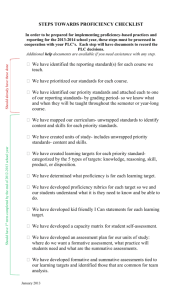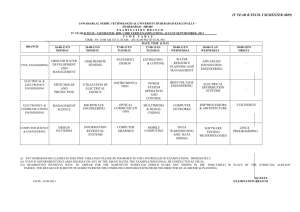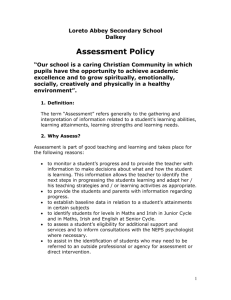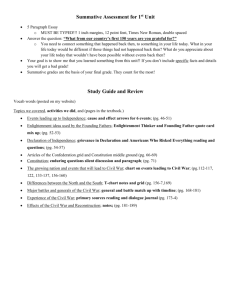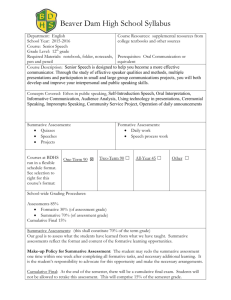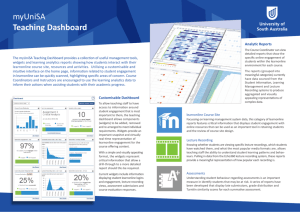1 Assessment Principles and Requirements
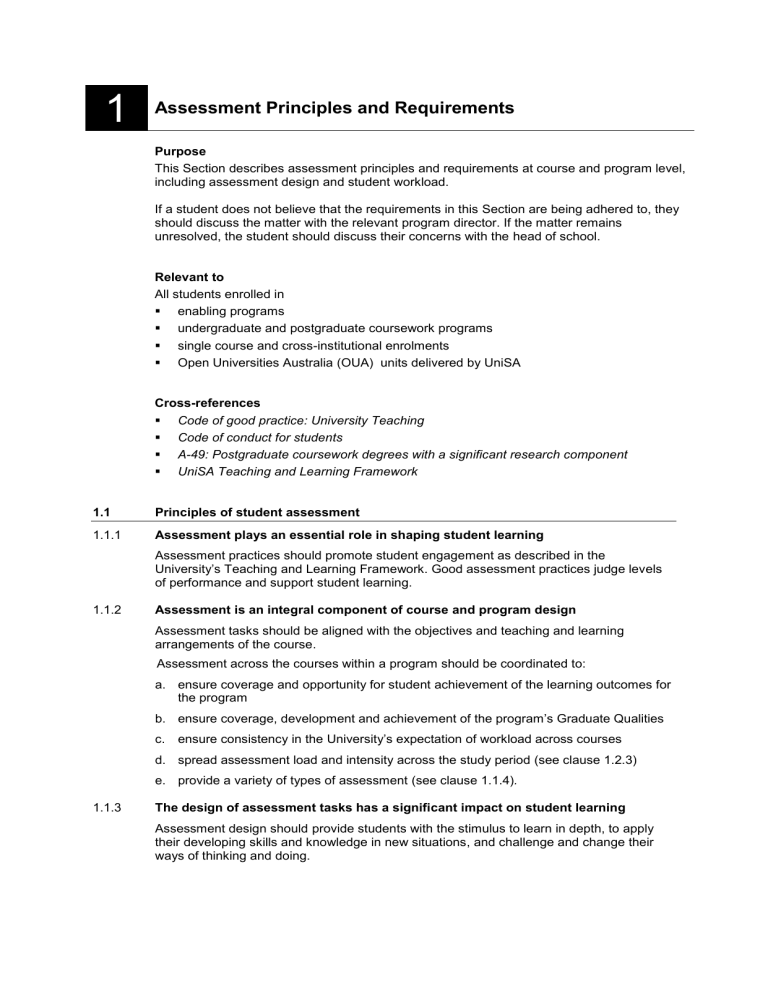
1.1
1
Assessment Principles and Requirements
Purpose
This Section describes assessment principles and requirements at course and program level, including assessment design and student workload.
If a student does not believe that the requirements in this Section are being adhered to, they should discuss the matter with the relevant program director. If the matter remains unresolved, the student should discuss their concerns with the head of school.
Relevant to
All students enrolled in
enabling programs
undergraduate and postgraduate coursework programs
single course and cross-institutional enrolments
Open Universities Australia (OUA) units delivered by UniSA
Cross-references
Code of good practice: University Teaching
Code of conduct for students
A-49: Postgraduate coursework degrees with a significant research component
UniSA Teaching and Learning Framework
Principles of student assessment
1.1.1
Assessment plays an essential role in shaping student learning
Assessment practices should promote student engagement as described in the
University’s Teaching and Learning Framework. Good assessment practices judge levels of performance and support student learning.
1.1.2
1.1.3
Assessment is an integral component of course and program design
Assessment tasks should be aligned with the objectives and teaching and learning arrangements of the course.
Assessment across the courses within a program should be coordinated to: a. ensure coverage and opportunity for student achievement of the learning outcomes for the program b. ensure coverage, development and achievement of the program’s Graduate Qualities c. ensure consistency in the University’s expectation of workload across courses d. spread assessment load and intensity across the study period (see clause 1.2.3) e. provide a variety of types of assessment (see clause 1.1.4) .
The design of assessment tasks has a significant impact on student learning
Assessment design should provide students with the stimulus to learn in depth, to apply their developing skills and knowledge in new situations, and challenge and change their ways of thinking and doing.
1.1.4
1.1.5
1.1.6
1.1.7
1.1.8
1.1.9
Assessment tasks should be diverse
Assessment practices should be inclusive and support equity and disability principles, catering for both individual and group diversity. All assessment models have limitations. A variety of assessment techniques should be used to minimise disadvantage. Inclusive language must be used to avoid gender, racial, cultural or other language bias.
Assessment should be used for both formative and summative purposes
Formative assessment helps students and staff to identify strengths, weaknesses, and ways to improve and enhance learning attainment. Summative assessment provides information to judge the extent to which a student has achieved objectives relevant to the
Graduate Qualities in a course or program .
Good assessment requires clear articulation of purpose, requirements, standards and criteria
Assessment works best when students have a clear understanding of assessment expectations. Assessment criteria must be clear and explicit so that students know what is expected of them for each assessment task.
Good assessment practice allows students to receive timely feedback on their learning
High quality feedback is clear and constructive, and enables students to make sensible judgements about modifying aspects of their academic performance to meet course objectives. Feedback should enable students to understand their level of development of the required skills, their mastery of the understandings embedded in the assessment activity, and how their performance in each domain could be improved in subsequent learning activities.
Assessment methods should be valid, reliable and consistent
Assessment methods and judgements must be valid and reliable, and regularly subjected to peer review, discussion and consensus. The setting and marking of assessment tasks should be subject to moderation processes to improve their validity and reliability. External benchmarking should be included where appropriate
Good assessment practices should promote ethical academic conduct
Ethical academic conduct is both a staff and student responsibility. Good assessment design can educate students about appropriate academic conduct, and minimise academic misconduct.
1.2
1.2.1
1.2.2
1.2.3
Requirements for coursework programs
For undergraduate programs, the provisions specified in clauses 1.2.2 to 1.2.5 below are mandatory. These provisions are discretionary for postgraduate programs.
When planning teaching, learning and assessment activities, academic staff must take into consideration the total time that students will need to allocate to all major and related tasks required to engage with the course content and successfully achieve the desired course outcomes. This includes attendance at all face to face delivery components, participation in online activities, completion of assessment tasks, and self-directed, independent course related reading, research and reflection. In total, the time students need to spend on all activities should not exceed 35 hours per unit within a course (eg 4.5 unit course x 35 hours = 157.5 hours).
Mapping assessment load and intensity across a program is essential. Unless a specific case is made for variation that is approved by school and division boards, due dates for assessment tasks in core courses will be coordinated to ensure students are not unreasonably overloaded at any one time during a study period. Program directors are
1.2.4
1.2.5 responsible for monitoring assessment within courses in their program to ensure compliance with this requirement. This may include supporting a variation to the assessment requirement at clause 1.2.5 (b) below.
For the purpose of this policy, assessment tasks that contribute to the final grade in the course are divided as follows: a. Continuous assessment tasks occur within regularly scheduled class time (or equivalent time periods for online/external students) and do not require any additional preparation time, other than normal expectations for class participation. A course may have a number of these tasks during the study period. Collectively these are known as
‘a set of continuous assessment tasks’. b. An assessment point occurs when students are asked to submit work at a specified point of time in the course, including end-of-course examinations where used. Tasks associated with assessment points require students to work beyond their regular contact and preparation time. c. Additional assessment requirements (also referred to as assessment hurdles) are conditions for passing a course or assessment task other than the overall mark. They include, but are not limited to, achieving a specified minimum in a particular aspect of the course, or specified attendance requirements.
Unless a specific case is made for variation that is approved by school and division boards, the following requirements apply: a. There will be no more than three assessment points in any course, plus the option of one set of continuous assessment activities. The length, depth and complexity of each assessment task should reflect the unit value of the course and be consistent with word count requirements in 1.2.5(c). b. At least 15% of the total assessment for the course will occur in the first half of the study period in which the course is taught. c. For a 4.5 unit course, individual students will be required to complete learning activities that are equivalent to no more than 4,500 words of assessed writing. This word count should be adjusted proportionately for less complex forms of writing such as journals and examination answers. d. Where participation is assessed it should be clear how it is related to course objectives and on what criteria it will be judged. In undergraduate courses the percentage weighting given to participation in class or by designated online activities will be no more than 10% and will count as one assessment point. e. All text-based assessment tasks should be submitted electronically using the
University’s electronic assignment management system within learnonline . Special provisions will be made for those students who do not have access to electronic communication.
The above requirements apply particularly to courses where assessment is principally textbased. In courses where assessment is of a different kind, the requirements should be adjusted, but aim to be equivalent in complexity and workload. This requires being aware of the workload involved (eg in group work, or the creation and development of a performance) and the degree of intellectual independence and creativity required.
Staff should avoid the overuse of continuous assessment tasks, particularly in higher level courses.
1.3.4
1.4
1.4.1
1.3
1.3.1
1.3.2
1.3.3
Communication of assessment requirements to students
The course outline will explain the expectations of each assessment task, its relationship to the program Graduate Qualities, and the criteria and standards by which performance will be judged.
Students will also be made aware of assessment requirements such as length, weighting, submission dates, provisions for extension and re-submission, form of presentation and the extent to which these (and the assessment task itself) are negotiable between academic staff and students (see clause 2.1).
Additional assessment requirements (see clause 1.2.4 c) should be included in the course statement and in the section of the approved course outline headed ‘Additional assessment requirements’.
Students are responsible for ensuring they are aware of and understand the assessment requirements for the course(s) in which they are enrolled.
1.4.2
1.4.3
1.4.4
1.4.5
1.4.6
Feedback to students
Feedback is one of the most important aspects of the learning process and serves the critical function of enabling students to make timely and informed judgements about their performance, so that subsequent assessment can be undertaken with improved likelihood of success and enhancement.
Feedback is provided in a variety of ways, including: a. model answers to questions b. verbal comments from teaching staff, both individually and to the class c. emails and online forum comments, both individually and to the class d. verbal comments on presentations and participation in class discussions e. preliminary assessment task advice f. face-to-face assessment task discussion, individually, and in groups g. written feedback comments regarding drafts and assessment tasks h. written comments on feedback forms i. via the University’s electronic assignment management system within learnonline .
Feedback on assessment tasks for students studying internally will normally be provided within ten working days, but no longer than 15 working days following the deadline for submission of the assessment task. For those students studying externally and offshore, feedback will be provided within 15 working days.
Where a subsequent assessment task builds on earlier assessment tasks, the earlier assessment task will be returned at least ten working days before the deadline for submission of the later assessment task (or equivalent for intensive teaching).
Where possible, some expectation should be built into the assessment design and grading process requiring students to acknowledge and act on the feedback provided.
Feedback for summative assessment will be provided via the University’s electronic assignment management system within learnonline and will include as a minimum: a. an indication of the Graduate Qualities being assessed by the task b. grades and/or comments in response to key components of the task, and c. a summary comment.
1.4.7 Where summative examinations are used in a course, course coordinators will ensure that arrangements are made for appropriate feedback to students (eg provision of worked solutions on the learnonline course site or group feedback sessions).
1.4.8 In the case of summative examinations, students have the right to sight their examination scripts, but are not entitled to either the original or a copy. (In the case of offshore, OUA or external students, this will be arranged on a case by case basis.) Students seeking individual feedback from a summative examination may contact their course coordinator within ten working days following the finalisation of results for that study period (see clause
8.1.1) to make an appointment. (In the case of offshore, OUA or external students, this appointment may occur by email or telephone.)
1.4.9 Where students are undertaking placements (see Section 4), it is expected that they will be provided with regular and constructive feedback about their performance, either by the course coordinator, designated University placement supervisor and/or the supervising professional in the workplace.
1.5
1.5.1
Examinations as an assessment technique
Summative examinations may not contribute more than 70% of the marks on which final grades for any course are based.
1.5.2 Where a professional association requires that summative examinations in any course count for more than 70%, schools must seek a formal exemption from the division.
1.6
1.6.1
Management of assessment
Under the Higher Education Support Act 2003 and as provided by the Privacy Act 1988 , the University is obliged to take reasonable steps to protect students’ personal information against loss, unauthorised access, use, modification or disclosure, and misuse. This obligation includes the management of assessment, the submission of assessment tasks including the use of cover sheets, and the provision of results and feedback to students.
The provisions in clauses 1.6.2 and 1.6.3 apply to ensure compliance with this requirement.
1.6.2 Assessment task cover sheets: a. Where students submit an assessment task in hard-copy, they are required to include a signed and completed cover sheet. b. Where students submit an assessment task via the University’s electronic assignment management system within learnonline , a cover sheet is automatically created and includes the student’s name and student ID. c. For group assessment tasks, each member of the group is required to sign the cover sheet, and each student will receive written feedback on their group assessment task.
1.6.3 Distribution of marked assessments: a. Course coordinators will determine how marked assessment tasks are returned to students. This information will be included in the course outline. b. Acceptable means by which marked assessment tasks can be returned to students include: i) electronically to the individual student via learnonline ii) collection during class, only by the student iii) collection from the school office or a staff member (students must present their student ID card as proof of identity)
iv) collection from course coordinator, lecturer or tutor by prior arrangement v) by post (students attach an A4 stamped, self-addressed envelope with correct postage to their assessment task) vi) test /exam results may be displayed publicly provided that only the student ID and result are included. A student’s name and ID must not be visibly linked in the public domain. c. Marked assessment tasks must not be left unattended for collection.
Students are required to keep a copy of all work submitted and maintain it until the final course grades are recorded, submitted and released.
1.6.4
1.7 Online staff resources
Graduate Qualities
Code of good practice: University Teaching
Learning and Teaching Unit - Teaching in Higher Education
Learning and Teaching Unit - Learning Advice
UniSA student services

